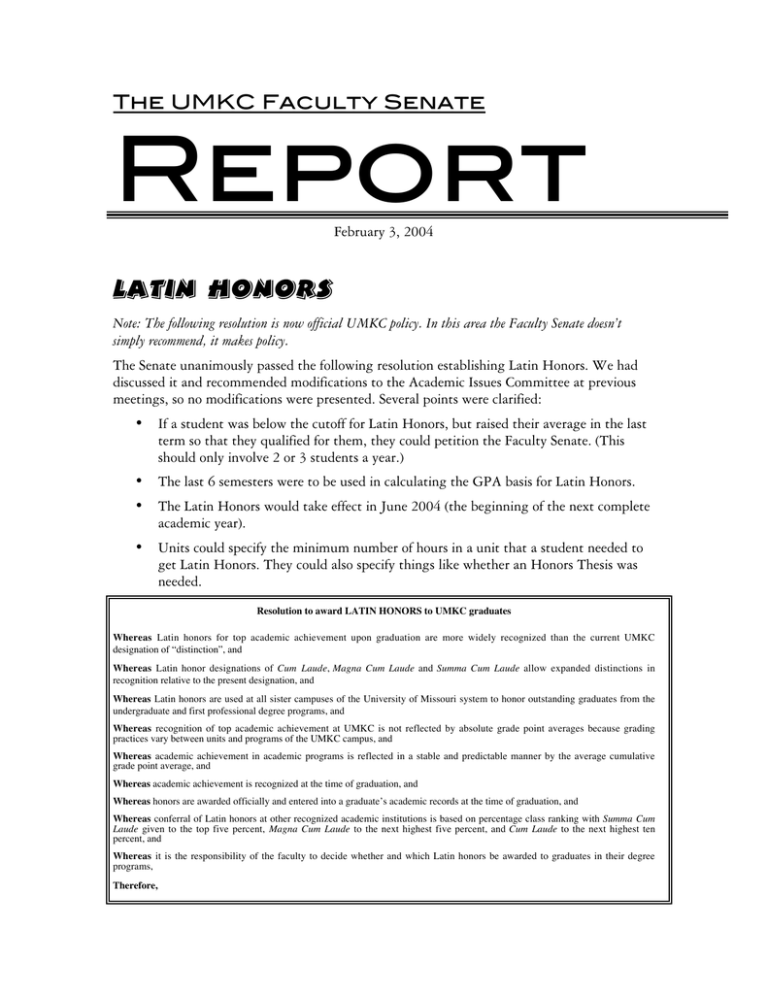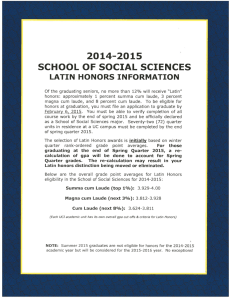Report Latin Honors The UMKC Faculty Senate
advertisement

The UMKC Faculty Senate Report February 3, 2004 Latin Honors Note: The following resolution is now official UMKC policy. In this area the Faculty Senate doesn’t simply recommend, it makes policy. The Senate unanimously passed the following resolution establishing Latin Honors. We had discussed it and recommended modifications to the Academic Issues Committee at previous meetings, so no modifications were presented. Several points were clarified: • If a student was below the cutoff for Latin Honors, but raised their average in the last term so that they qualified for them, they could petition the Faculty Senate. (This should only involve 2 or 3 students a year.) • The last 6 semesters were to be used in calculating the GPA basis for Latin Honors. • The Latin Honors would take effect in June 2004 (the beginning of the next complete academic year). • Units could specify the minimum number of hours in a unit that a student needed to get Latin Honors. They could also specify things like whether an Honors Thesis was needed. Resolution to award LATIN HONORS to UMKC graduates Whereas Latin honors for top academic achievement upon graduation are more widely recognized than the current UMKC designation of “distinction”, and Whereas Latin honor designations of Cum Laude, Magna Cum Laude and Summa Cum Laude allow expanded distinctions in recognition relative to the present designation, and Whereas Latin honors are used at all sister campuses of the University of Missouri system to honor outstanding graduates from the undergraduate and first professional degree programs, and Whereas recognition of top academic achievement at UMKC is not reflected by absolute grade point averages because grading practices vary between units and programs of the UMKC campus, and Whereas academic achievement in academic programs is reflected in a stable and predictable manner by the average cumulative grade point average, and Whereas academic achievement is recognized at the time of graduation, and Whereas honors are awarded officially and entered into a graduate’s academic records at the time of graduation, and Whereas conferral of Latin honors at other recognized academic institutions is based on percentage class ranking with Summa Cum Laude given to the top five percent, Magna Cum Laude to the next highest five percent, and Cum Laude to the next highest ten percent, and Whereas it is the responsibility of the faculty to decide whether and which Latin honors be awarded to graduates in their degree programs, Therefore, Be it resolved that effective June 1, 2004, for all semesters following this date, UMKC terminates the practice of conferring “distinction” honors; and Be it resolved that effective June 1, 2004, for all semesters following this date, UMKC graduates will be awarded Latin honors using the following policy: 1. Latin honors for undergraduates will be awarded using students’ official UMKC cumulative grade point average during the semester of graduation. 2. The minimum grade point average for undergraduate students to receive Latin honors will be calculated for each rank of Latin honors for each academic unit once per year using the official cumulative grade point averages of students who graduated during the preceding six semesters. For the College of Arts and Sciences three separate minimum grade point averages will be calculated for each rank of Latin honors for students in Bachelor of Arts programs, for students in Bachelor of Science programs, and for students in all other bachelor degree programs. 3. The academic units will be informed by the Registrar’s Office by October 1 of the minimum grade point averages necessary to qualify for each rank of Latin honors during the Fall, Spring and Summer graduations of the academic year. 4. Undergraduate students who rank in the top five percent of graduates in their academic unit, based on the minimum grade point average established for the academic year, and who are approved by the faculty in their academic unit for this honor are eligible to be awarded their degree with Summa Cum Laude honors. 5. Undergraduate students who rank in the top ten percent of graduates in their academic unit, based on the minimum grade point average established for the academic year, who are approved by the faculty in their academic unit for this honor, and who do not receive Summa Cum Laude honors are eligible to be awarded their degree with Magna Cum Laude honors. 6. Undergraduate students who rank in the top twenty percent of graduates in their academic unit, based on the minimum grade point average established for the academic year, who are approved by the faculty in their academic unit for this honor, and who do not receive Summa or Magna Cum Laude honors are eligible to be awarded their degree with Cum Laude honors. 7. A list of candidates for graduation will be forwarded by the Registrar’s Office to each academic unit approximately four weeks prior to final examinations. This list will include Latin honor recommendations based upon the minimum grade point averages established for the academic year and the candidates’ cumulative grade point averages. 8. Graduates in First Professional degree programs (Dentistry DDS, Medicine MD, Law JD and Pharmacy Pharm-D) may be awarded degrees with Latin honors as determined by policies established by the academic unit responsible for the degree. No academic unit will establish policies that exceed the percentage ranges for the ranks of Latin honors established for undergraduate students. 9. Degrees will be awarded with Latin honors as recommended unless faculty action is taken to override the recommendations. Faculty within an academic unit may override the recommendation of Latin honors for individual students by having the Dean’s Office of the academic unit notify the Registrar prior to the final examinations for the semester that the student(s) will receive a lower level of Latin honors or no Latin honors at all. 10. Latin honors will not be awarded to students in graduate degree programs. 11. The Registrar’s Office will not process Latin honors that are inconsistent with these policies, and will submit all academic unit recommendations that are inconsistent with these policies to the Faculty Senate for review. 12. The full Faculty Senate must approve changes to this policy one calendar year in advance of implementation by majority vote in a secret ballot. 13. The full Faculty Senate must approve petitions for exception to this policy by majority vote. This vote may be taken by electronic means including the use of UMKC’s email system. This Resolution was drafted by the Academic Issues Committee of the UMKC Faculty Senate and submitted for action by the Faculty Senate on February 3, 2004. New Degree Programs/Library The Miller Nichols Task Force has met. They urge that faculty let them know of any specific teaching/research needs or ideas (contact either Prof Joan Dean or Laura Gayle Green). There will be focus group sessions. Ballard said that the architect that has been chosen for this project has done many learning centers previously, so he should be a major asset. Vice Provost Ron MacQuarrie told the Senate that the CBHE is taking a more active role in approving new degree programs, and that the on-campus procedures for approving them will be substantially tighter. New degree program proposals, or substantial changes in requirements for existing programs, will need explicit reports from the library regarding the adequacy of their resources to support the program. They also need to specify expected enrollment and SCH expectations, and the consequences of not meeting these will be spelled out. In the past enrollment proposals have often been ethereal guesses, and the expectations have often been high. There are better ways of estimating enrollment, and these will need to be used. Finally, the amount of interdisciplinary cooperation will be an important component of the evaluation. Parental Leave/Day care There was some discussion of the UM parental leave policy. Or rather the lack of a policy, for at present things are left up to departments and units. The IFC members present (Waterborg, Schweitzberger) argued that the current non-policy was best, because it allowed maximum flexibility to meet unusual circumstances. Others argued that there was a lack of consistency between units, and some had relatively generous policies while others were parsimonious. We discussed the possibility of having a model policy, either put forward by the Chancellor or the deans, that could be placed in a faculty handbook and provide some guidelines. The suggested policy might not be binding, but it would help in making fair decisions. Another issue briefly mentioned was the issue of daycare. This affected many faculty and staff, and was a problem for students, or potential students. (It is unknown how many people don’t come to UMKC because they don’t have anyone to watch their children, and many people have trouble when snow days close K-12 schools.) The Vice Chancellor for Student Affairs Office has been looking into this issue, but some frustration was expressed at the apparently unending study. There were legal issues of liability, but other institutions had resolved these problems (including JCCC, Vice Chancellor Long’s previous institution) so it was unclear why UMKC couldn’t. This issue was suggested for the next agenda. Department Chairs and Division Heads The Senate discussed a draft document supplementing the University’s Rules for the Appointment of Department chairs and Division Heads. The draft said the chair should be tenured, preferably a full professor, should have a record of scholarship “in a discipline represented within the mission of the department,” be committed to the goals of the department, school and university and, if possible, have managerial or administrative experience. Several points were raised in the discussion: • • • • The document would not supersede or overrule any unit’s established bylaws regarding procedures on appointment and evaluation of chairs and division heads. Some schools don’t have definite terms of appointment. The draft does not specify a term, noting that needs vary, but states that “department chairs will normally be appointed to four year terms.” Not all units have systematic evaluations of chairs. The draft calls for the dean to evaluate the performance of chairs annually, and they are “encouraged to gather input from faculty” for these reviews. Additionally, a formal review of the chair’s performance, “in which the dean consults with the departmental faculty must be conducted at least once during each term of appointment.” “The chancellor appoints chairs after receiving a recommendation from the dean…and after the department faculty has been consulted.” Some Senators thought that if the chancellor did not accede to the recommendations of the unit s/he should be required to give written reasons. Others said that we could probably not require that, but could recommend the policy. • On the other side, could the Chancellor fire a chair if the faculty and dean wanted to keep him/her? MacQuarrie and Ballard said she definitely could, since is an administrative position. Some Senators argued that the Chancellor might have to go through the chain of command, just as Nixon did when he tried to fire the Special Prosecutor. • Some felt that the chairs needed higher salaries than they now get. This seemed to vary with units. The deans are supposed to gather information from the faculty of their units on the proposed guidelines. Budget We don’t know about the budget, but Ballard said we needed to begin developing one. They are playing around with various scenarios. The best is that there will be no further cuts, while others are bleaker. They are figuring on a 3% to 5% tuition increase, and are counting on increased enrollment. Respectfully submitted, Harris Mirkin, Senate Secretary





